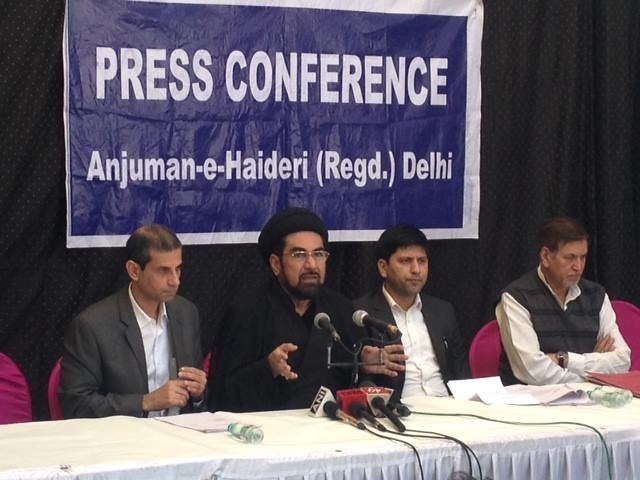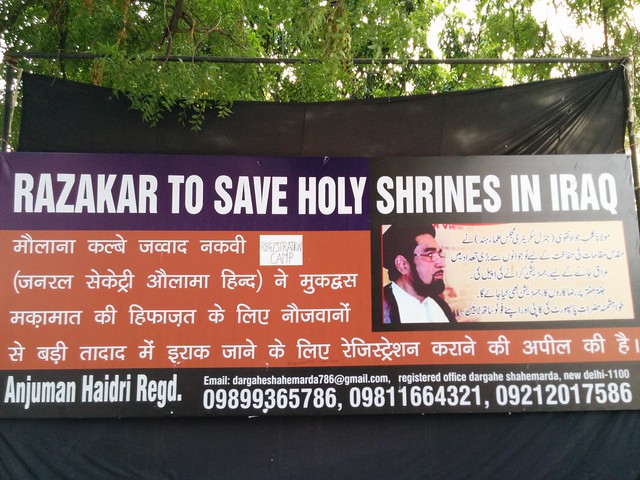By Uzair Hasan Rizvi,
The annual ritual of Arbaeen – it falls on December 12 this year – has commenced. Young and old, men and women, more than 20 million of them clad in black are marching towards the city of Karbala, south-west of Baghdad in Iraq. Chants of Labbaik Ya Husain (being at the service of Husain, the grandson of Prophet Mohammed) rent the air.
These mourners from Shia faith are visiting the shrine of Imam Husain, risking their lives to travel through Iraq, braving the threat of deadly attacks, which have in the past targeted the Shia community. Many pilgrims walk barefoot from the city of Najaf to cover a distance of 80 KM; some even take over 500 KM foot journey from the port of Basra to Karbala over two weeks. Braving the scorching sun and chilling nights, the pilgrims now also face threats passing through the ISIS – known as Islamic State – controlled areas.

Press Conference held by Anjuman e Haidari, attended among others by Advocate Mehmood Pracha, Kalbe Jawad, Bahadur Abbas Navi
Arbaeen marks the end of a 40-day mourning period following Ashura, commemorating the martyrdom of Husain, one of the Shia Islam’s most revered figures. He gave his life in saving Islam against the tyrannical rule of Yazid in 680 AD. Karbala is one of the holiest places for Shia Muslims as it holds the shrine of Imam Husain.
Millions throng to pay the respect to the bereaved Imam. Last year, more than 20 million people visited the shrine. This number is almost four times more than the annual Hajj pilgrimage in Mecca. Easily, one of the largest annual religious peaceful congregations, only the Hindu pilgrimage of Kumbh Mela in India sees more pilgrims than this, but it is held once every three year.
While Arbaeen is an exclusive Shia spiritual exercise, Sunnis, Christians, Yazidis, Zoorastrians and people from other faiths also take part in both the pilgrimage as well as for serving the devotees.
The pilgrimage was banned during the regime of Saddam Husain but was reintroduced in 2003.
Security threats in Iraq
Many pilgrims have lost their lives during their pilgrimages to holy Karbala since 2003 in bombings and armed attacks. This year with ever-growing presence of the radicalized ISIS terror group, the threat is more extreme as many hardliners denounce Shias as Muslims and regard them as apostates; thus justifying their killing. They attack both the believers and their places of worship. Last year, the terror groups attacked the pilgrimage with suicide bombers and rockets leaving dozens dead.
Security forces in Iraq have been taking tougher measures to secure the routes for this year’s pilgrims, according to the Iraq state news agency. The police have increased the number of highway patrol and check points. They are working in tandem with the National Security, the Army and the Intelligence agencies to counter the attacks.
Shias in India
Shia is a minority but a growing community in India. In July, more than 6,000 Shias had applied for visa at the Embassy of Iraq for this annual pilgrimage and volunteering for the relief mission. Incidentally, many others from Sunni and Hindu communities joined in to be a part of the volunteers in facilitating the relief work for Shia community in Iraq.
The Indian government is sceptical in issuing visas to these pilgrims-cum-volunteers, apparently because of the security fear as ISIS has also listed India as one of their targets. It is also being reported that 40 missing Indians in Iraq have been shot dead by ISIS.
About two week ago, a Shia delegation known as Anjuman-e-Haideri flying to Iraq headed by a notable Shia cleric Maulana Kalbe Jawad was detained at the Delhi airport.
The Maulana, who clarified that they had taken prior permission from the Ministry of External Affairs and were going for the rehabilitation and relief work, later condemned the move. Mahmood Pracha, legal advisor of the delegation said, “The lookout circulars (LOC) issued against the delegates were illegal and so is the forcible abduction and detention of the delegates by Delhi Police.”
Anjuman has now written to the Prime Minster and the Home Minster seeking intervention. Bahadur Abbas Naqvi, general secretary of Anjuman-e-Haideri, told TwoCircles.net that the government has stopped a peaceful delegation that was going to voluntarily serve the pilgrims and to make a public statement that Muslims are against terrorism. “When Sri Sri Ravi Shankar can go, why was the delegation led by Maulana Kalbe Jawad denied permission,” he wondered.

File photo
Unrelenting Spirit
Even after the potential life threats, the devout defy the worst security conditions, terrorists’ threat. Every year the attacks take place but with each passing year, the pilgrims continue to grow in numbers. What moves them?
It’s the spirit to challenge terrorism and oppression that these worshippers have embodied from Husain, who defied tyranny, about 1400 years ago but continues to live among the hearts of billions of faithful.
Being at the service of Husain, expresses the idea of fighting for the justice and being on the side of the justice. Once again, ‘Labbaik Ya Husain’ is a slogan of believers who only worship Allah and thus they support the righteous slave of Allah – the Imam Husain. Just as Mahatma Gandhi had aptly summed up after achieving freedom for India “I learnt from Husain how to achieve victory while being oppressed.”
(Uzair Hasan Rizvi is a freelance journalist and journalism student at AJK Mass Communication Research Centre, Jamia Millia Islamia, New Delhi, India. He tweets at @rizviuzair)
Related:
